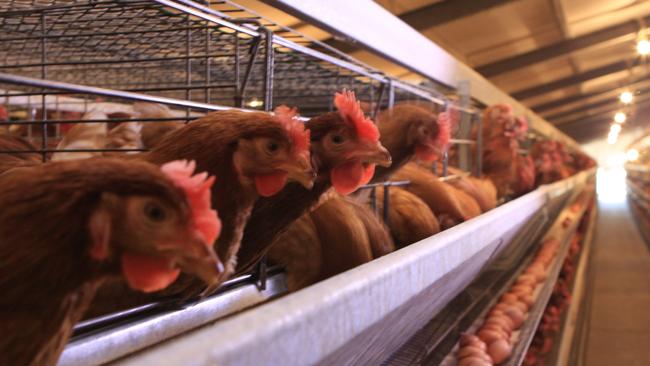Andrew Bolt: Caged egg ban may hurt the poor more than help the hens
Chooks don’t think and feel like humans and dumb green ideas could now double or even triple the price of eggs.
Andrew Bolt
Don't miss out on the headlines from Andrew Bolt. Followed categories will be added to My News.
First, a reminder: a chicken is just a chicken. Chooks don’t think and feel like humans.
And a tip: dumb green ideas already cost you plenty and now could double or even triple the price of eggs, making them too expensive for the poor.
That’s because Australia’s agricultural ministers meet this Thursday to discuss banning caged eggs by 2036, 12 years earlier than planned.
They know we’ve been coached by animal rights campaigners into thinking hens in battery cages producing a third of our eggs are sad, but free-range hens out in the paddock couldn’t be happier.
But setting caged hens free will cost many egg farmers millions.
They’ll need much more land to convert to free range, and face extra costs in making sure their hens stay healthy and get their fair share of food in the new free-for-all.
Those extra costs will of course be passed on.
Just compare. A dozen caged eggs here costs under $5. But the price of eggs in New Zealand, which banned battery hens this year, has rocketed to more than double that, and for just 10 eggs in a carton.

That means New Zealand now has the second-most expensive eggs in the world, after Switzerland, which also bans caged eggs.
But are these bans based on emotion, not facts? Does a chicken in a cage really feel like Jean Valjean in a cell?
Sydney University’s Dr Jeff Downing a decade ago tested stress levels of caged chickens and free-range ones, measuring the quantity of stress hormones, corticosterone, in their eggs.
Surprise. Virtually no difference.
“Once you get into very large group sizes, there is so much social interaction that this can be quite stressful for some hens,” said Downing. “There is far more potential in these big group sizes for social stress.”
Indeed, it’s chickens-against-chickens that taught us “hen-pecked”.
Dr Charles Milne, Victoria’s former chief vet, also warned that a chicken in a paddock might not be happier.
“Chickens are related to forest-dwelling birds. They don’t like open spaces. Free-range can deliver huge welfare problems.”
No wonder the birds are anxious, not just figuring their place in the pecking order but worrying about hawks and foxes. Diseases also spread more easily, and food shared less fairly.
Yet it’s for this that eggs could become another luxury, hurting the poor more than helping the hens.
Originally published as Andrew Bolt: Caged egg ban may hurt the poor more than help the hens



